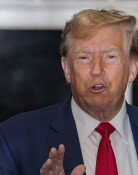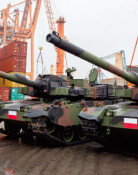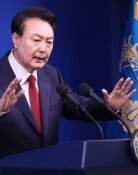Kim hails for 'peace without nuclear weapons and threats'
Kim hails for 'peace without nuclear weapons and threats'
Posted September. 20, 2018 07:37,
Updated September. 20, 2018 07:37
The statement was simple. “We are committed to work together actively to build the Korean Peninsula into a land peace free of nuclear weapons or threats,” said North Korean leader Kim Jong Un. The Pyongyang Joint Statement between the two Koreas has set forth North Korea’s measures for detailed progress for denuclearization. First, North Korea promised to permanently dispose its Dongchang-ri missile testing center and launch pad under the observation of experts of related countries. It also expressed intention to permanently discard nuclear facilities in Yongbyon, in accordance with corresponding measures of the United States.
Kim Jong Un’s latest remarks also call upon the United States. Denuclearization means a nuclear-free Korean Peninsula that is absent of North Korea’s nuclear weapons as well as U.S. threats to North Korea. North Korea has criticized the joint South Korea-U.S. military exercise as "exercise for nuclear war." North Korea has been demanding that the United States suspend military exercise, its nuclear umbrella over South Korea and scrap its promise of escalation control. It is a point that we should bear in mind to ensure that the joint security agreement between South Korea and the United States does not weaken.
North Korea made a gesture to the United States this time again, displaying another "bombing event." It promised to scrap its missile test field under expert observation and even nuclear facilities in Yongbyon in accordance with corresponding measures of the United States. The first stage would be preemptive, the second phase conditional. The first phase involves the invitation of experts in the explosion of the missile test site, which has already undergone dismantlement. The abolition of the Yongbyon facilities can be seen as a step to give up future nuclear power by freezing nuclear facilities. We would have to wait and see if the promise is carried out since the promise would be carried out only when there is an official declaration of the Korean War.
The young North Korean leader has shifted responsibility over to the United States, implying that a real progress in denuclearization is up to U.S. measures. The key is how Washington will accept. U.S. President Donald Trump wrote in a Twitter posting immediately after the Pyongyang agreement that “Kim Jong Un has agreed to allow nuclear inspections, subject to final negotiations, and to permanently dismantle a test site and launch pad in the presence of international experts.” However, Trump could be attaching too much significance to “the presence of international experts”, as it does not equal to nuclear inspection. Kim could have expressed, though not officially, willingness to undergo nuclear inspection, a necessary step for denuclearization. It is expected that the United States will come forth with a more concise position when South Korean President Moon Jae-in meets President Trump in Washington while attending the UN General Assembly in New York on next Tuesday.
Kim also promised to visit Seoul in the near future. “The near future means within this year, if there are no special circumstances,” explained President Moon. If Kim visits Seoul, it will be the first time for a North Korean leader to visit the South Korean capital. Kim’s predecessor promised to visit Seoul in the June 15 Joint Declaration in 2000, but it turned out to be only wishful thinking. With three rounds of inter-Korean summits held in Pyongyang, it is time for the next meeting to be held in Seoul.
President Moon's reiteration of a return visit to Seoul appears to be relevant with South Korea’s goal to achieve end of war declaration within the year. South Korea may be planning to join the talks after achieving a successful bilateral summit between North Korea and the United States, but it might be conceiving a plan to invite President Trump to Kim’s visit to Seoul and declare the end to the Korean War altogether. This would, of course, be possible only when North Korea-U.S. talks resume and North Korea proceeds with actual denuclearization.
Headline News
- Korean president faces debate limitations unlike U.S. counterpart
- KEPCO's first quarter profits failed to meet market expectations
- Teenagers are left out of discussions about national pension
- 2 consultative bodies submit minutes regarding increasing number of medical students
- Woo Sang-hyuk's rivalry and friendship transcend borders







